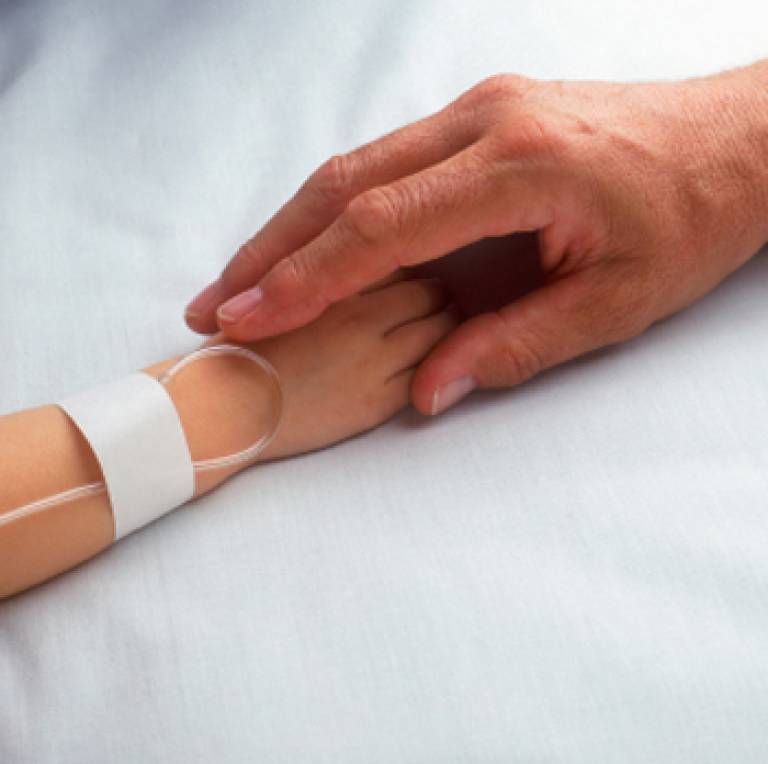Researchers pioneer safer bone marrow transplants for sick children
2 September 2009
Links:
 ucl.ac.uk/ich" target="_self">UCL Institute for Child Health and Great Ormond Street Hospital
ucl.ac.uk/ich" target="_self">UCL Institute for Child Health and Great Ormond Street Hospital
Researchers from the UCL Institute for Child Health (ICH) and Great Ormond Street Hospital (GOSH) have pioneered a safer method of bone marrow transplantation for extremely sick children.
A study published in The Lancet concludes the use of antibodies instead of chemotherapy enables successful transplantation for children with genetic defects in their immune systems.
Dr Persis Amrolia, a consultant in bone marrow transplant at ICH-GOSH who led the research, writes that the new treatment may reduce the short and long-term toxicity associated with stem cell transplants in children.
Children with primary immunodeficiencies (PID) suffer from genetic defects of their immune systems that render them susceptible to infection and other complications. Without a stem cell transplant many such children will die in childhood.
Stem cell transplants can cure these diseases by replacing the defective immune system with one derived from healthy normal donor bone marrow. Around 50 children with PID are transplanted each year in the UK.
Conventional conditioning for a stem cell transplant involves chemotherapy, radiotherapy, or both to create space for the donor stem cells, and prevent the patient rejecting them.
This chemoradiotherapy may result in severe damage to the liver, gut or lungs, as well as hair loss and sickness. It also often leads to problems with growth, puberty and infertility in later life.
Over the last 10 years, the bone marrow transplantation unit at Great Ormond Street Hospital has pioneered the use of gentler chemotherapy drugs to enable bone marrow transplant in children with PID with fewer side effects.
However, in certain groups of patients, such as babies under one year old, those going into transplant with severe damage to their lungs or liver, and those with DNA repair disorders, chemotherapy conditioning is poorly tolerated and results in high rates of mortality.
In this study, for the first time, the authors used monoclonal antibodies (immune molecules made by white blood cells) rather than high dose chemotherapy to wipe out the patients' diseased bone marrow, create space for the healthy bone marrow from the donor, and prevent rejection.
This study analysed the results of antibody-based conditioning in 16 children with PID who were too sick to undergo a traditional stem cell transplant. The researchers found that antibody-based conditioning was well tolerated despite the fact that most patients were extremely sick at the time of transplant.
The sickness and hair loss associated with high dose chemotherapy were not seen, and there was much less damage to the liver, lungs, and gut. Patients recovered twice as quickly as those given standard treatment and the rates of graft-versus-host disease (in which the transplanted cells see the patient as foreign and attack the host's skin, gut or liver) were similar to those with conventional transplant.
At an average of 40 months post-transplant, 13 of 16 patients (81%) were alive and cured from their underlying disease. Almost all of these patients now have excellent quality of life and it is predicted that they will have very little in the way of late effects.
This novel approach represents a shift from the paradigm that intensive chemotherapy or radiotherapy is needed for donor stem cell engraftment.
Dr Amrolia said: "Because this approach was experimental, we only used it on the sickest children, who we felt could not tolerate standard transplant chemotherapy. Given how sick these children were before transplant, the results are remarkable.
"What's really encouraging is in most of the children who had severe damage to their lungs, liver or gut prior to transplant, this has now resolved or improved, so we hope they will grow up to lead normal healthy lives.
"There's still a lot to do - at the moment this approach is probably not strong enough to enable transplant in patients with other genetic diseases and leukaemia and the challenge now is to develop similar targeted approaches for these diseases."
For more information about the ICH, GOSH and UCL's work in London follow the links above.
Image: two hands clasping on a hospital bed
UCL context
Great Ormond Street Hospital is the country's leading centre for treating sick children, with the widest range of specialists under one roof. With the UCL Institute of Child Health, it is the largest centre for paediatric research outside the US and play a key role in training children's health specialists for the future.
Related stories:
UCL team wins £500,000 grant to develop synthetic artery
Genetic link found to increased risk of ovarian cancer
 Close
Close

